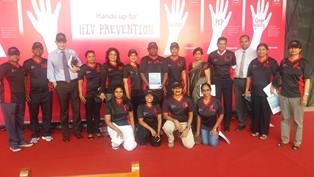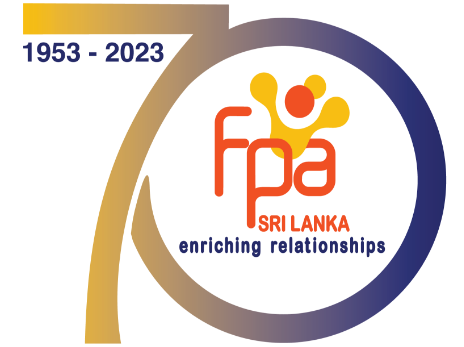World Aids Day 2016

In 1988 WHO declared December 1st as the World AIDS day. It is mostly dedicated to raising awareness of the disease caused by the spread of HIV and on prevention of the spread of this disease.
With this year’s theme “Hands up for HIV Prevention” the world AIDS day campaign looks at ways to improve prevention strategies, identifying key areas among specific groups of people who are vulnerable to transmission. In support of this global campaign, FPA Sri Lanka’s Directors and staff appeared with their prevention message of choice, which was published in the Organization’s social media sites and website.
The World AIDS Day walk 2016 was organized by the National STD/AIDS Control Programme (NSACP) together with FPA Sri Lanka and other stakeholders such as the Armed Forces, Sri Lanka Police, Prison Department, NGOs and CBO’s and Health institutions. It was held on the 1st of December 2016. The march commenced at the Ministry of Health premises and concluded at Campbell Park, Borella where over 2500 participants gathered together. Our Executive Director, Ms Thushara Agus was invited to speak at the event together with other invitees namely Ms Princy Mangalika (Positive Womens Network), Mr Alain Sibenaler ( UNFPA Sri Lanka), Dr Iyanthi Abeywickream – President (SLMA), Dr Jacob Kumaresan ( WHO), Dr Liyanage ( NSACP), Dr Palitha Mahipala (Director General of Health Services), Dr Weerasinghe (NSACP).
In his world AIDS day statement UN secretary General Ban Ki-Moon said “New infections are on the rise among people who inject drugs as well gay men and other men who have sex with men. The AIDS epidemic is increasing in Eastern Europe and Central Asia, fuelled by stigma, discrimination and punitive laws. Globally, people who are economically disadvantaged lack access to services and care. Criminalization and discrimination foster new infections each day. Women and girls are still especially hard hit.”
Sri Lanka is categorised as a country with a low level HIV epidemic and has maintained low adult HIV prevalence of less than 0.01% for the past decade with 3,000 (range 2,000 to 5,000) estimated adults of living with HIV in 2014. Based on the 2014 NSACP Annual Report, a cumulative total of 2,073 people were diagnosed with HIV. The proportion of male cases increased from 46% of cases in 2003 to 62% of cases in 2014 and majority (75%) of HIV cases are in the age group of 25-49 years, the same trend continuing for the past 10 years.
Heterosexual non-commercial sex was reported with the highest share among the modes of transmission in the period 2009-2014. However, a rising trend of male to male or bisexual transmission has been observed in the past few years. Geographical distribution of HIV cases diagnosed in all 25 districts indicates that over half of these cases are concentrated in the districts of Colombo, Gampaha and Puttalam with over 10 HIV cases per 100,000 population of the district. In terms of new cases, Colombo, Puttalam and Jaffna districts recorded the highest rates with 2 new HIV cases per 100,000 population in year 2014.
Through The Global Fund investment, FPA Sri Lanka was able to deliver the package of HIV prevention services to 4603 female sex workers in 10 Districts, 3638 men who have sex with men in 7 Districts, 7679 drug users in 8 Districts and 1727 beach boys in 7 Districts using a peer to peer education model. Further, 491 people who live with HIV were provided with facilitation to access treatment, care and support through the state and network agencies established by people living with HIV.
.png)


